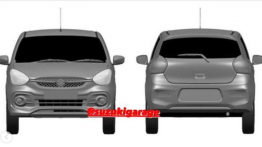The 2018 Maruti Ciaz (facelift) is in showrooms with an all-new petrol engine and minor cosmetic tweaks. New LED headlights, a new grille, new enclosures for the foglights, LED combination lights, a color TFT multi-information display, birch wood finish for the dashboard, rear headrests and a few feature additions are the gist of changes on the updated sedan.
The 2018 Ciaz is on the money in terms of its exterior look and road presence, while the interior look is so-so, and feel is not up there with the Honda City or Hyundai Verna. The birch wood trim looks elegant, but traditional Maruti nuances like the door trim flexing with the movement of the power windows, the rough edges of the centre console, and the rough, hard wearing plastics on the dashboard continue to be seen. However, all said and done, there is no denying that the Ciaz offers the most real estate for the money; we just wish the front seats had as much thigh support as the rear bench.
We got to sample the petrol MT and AT. The all-new 1.5L K15B unit develops 105 hp and 138 Nm of torque. The 1.5L petrol is certainly an improvement over the 1.4L VVT. The engine is tuned for good midrange performance, though we would have liked better low-end grunt too. At speeds of 20 km/h in 3rd or 40 km/h in 4th, there is a slight judder and a pause before the Ciaz gets going; the City handles these urban conditions with an air of refinement and smoothness which is missing on the Ciaz. Driving the 2018 Ciaz petrol, you can’t help but feel that performance isn’t as effortless as rivals. The Ciaz feels best when driven sedately, which most owners or their chauffeurs are bound to do.
However, on the highway, once at speed, the 2018 Ciaz easily maintains momentum, and cruising between speeds of 80-110 km/h isn’t a task. On the topic of speeds and highway, the 2018 Ciaz gets a speed limiter system which cannot be turned off. This, Maruti say, is keeping in mind upcoming safety standards for new cars in India. The system continuously beeps past 120 km/h, and between 80 - 120 km/h, it beeps twice in a minute. In addition, a seatbelt reminder for the front passenger is also standard as are reverse parking sensors.
Coming back to the way the 2018 Ciaz drives, there are no updates on the gearbox and the old 5-speed manual and 4-speed automatic are offered with the petrol engine. While the manual offers slick shifts, the 4-speed automatic is better than it sounds on paper. For city driving conditions, shifts are smooth and relatively fuss-free, and on the highway, the Ciaz AT can maintain 100 km/h with the engine ticking just under 2,500 rpm.
Of course, flooring the Ciaz AT and expecting it to move like Hamilton's W09 Mercedes sets unrealistic expectations. What the Ciaz AT is, is a relaxed cruiser, in city and highway conditions, and it certainly doesn't make you feel like its got only four gears. We prefer the AT variant's relaxed and stress-free drive over the manual.
On all petrol variants of the 2018 Ciaz, a lithium-ion battery assists in supplying torque to the front wheels and is recharged via regenerative braking. The system is seamless, and unless you are told about it, or you happen to glance it at the colour MID, you would think there is no electrical assistance. This assistance is one of the main reasons for the Ciaz’s class-leading fuel economy of 21.56 km/l for the MT and 20.28 km/l for the AT.
In terms of riding and handling, Maruti says minor tweaks were done to the Ciaz’s suspension, and on undulating roads, the vertical movement is kept well in check. The Ciaz is a safe handler and doesn’t throw any nasty surprises in a corner, but the steering could do with a bit more feel.
We got to experience some monsoon-ravaged roads, and the Ciaz’s comfortable suspension was well up to the job. The ride quality of the Ciaz feels plusher compared to the City or Verna, further bolstering the fact that the Ciaz makes for an ideal chauffeur-driven sedan.
All variants of the Ciaz offer dual front airbags, ABS, EBD, ISOFIX child anchorages, projector headlights and reverse parking sensors. The top end Alpha variants we drove feature LED headlights, LED foglights, LED daytime running lights, LED combination lights, 16 inch dual tone alloy wheels, keyless entry with push-button start, a touchscreen SmartPlay entertainment system with reverse camera, Android Auto and Apple CarPlay, cruise control, leather seats and rear AC vents. The AT variants gain Hill Hold assist and ESP. Compared to rivals such as the City, Verna and Yaris, the Ciaz does not offer side and curtain airbags, or a sunroof.
Prices for the 2018 Maruti Ciaz start at INR 8.19 lakhs and extend to INR 9.97 lakhs for the petrol MT; the petrol AT variants cost from INR 9.8 to INR 10.97 lakhs, and the diesel ranges from INR 9.19 lakhs to INR 10.97 lakhs, ex-Showroom.
Since its launch in 2014, Maruti has sold over 220,000 examples of the Ciaz in India, and the sedan has consistently sold more or as much as its rivals - Honda City and Hyundai Verna.
Overall, the 2018 Ciaz lacks the interior quality and finesse of its rivals. Regarding performance, the Ciaz satisfies most needs, but enthusiasts will continue to opt for the other Japanese brand. Where the Ciaz edges over the competition is in its value proposition. The real estate on offer, especially at the back, coupled with low cost of ownership, best in class fuel economy, a premium exterior, good ride quality and feature list, at a price that is INR 70,000 lower than the comparable City variant (Ciaz Alpha 1.5 AT vs City V CVT) are reasons enough for the Ciaz to find plenty of homes.
Maruti has not changed the core aspects of the Ciaz - its value for money proposition and class-leading fuel economy - and these assure the same footfalls for the Ciaz as before at the NEXA outlets.













































